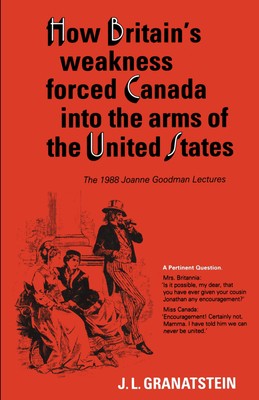
- We will send in 10–14 business days.
- Author: J L Granatstein
- Publisher: University of Toronto Press
- ISBN-10: 0802067468
- ISBN-13: 9780802067463
- Format: 14 x 21.6 x 0.6 cm, minkšti viršeliai
- Language: English
- SAVE -10% with code: EXTRA
How Britain's Economic, Political, and Military Weakness Forced Canada into the Arms of the United States (e-book) (used book) | bookbook.eu
Reviews
Description
In these lively, timely, and contentious essays J.L. Granatstein takes on one of the 'hoary central myths' of Canadian history and historiography: that the Liberals sold out Canada to the United States. It is a myth, he claims, perpetuated by Conservative historians such as David Creighton and George Grant, and by socialists like James Laxer. The original villain of this long-running melodrama is not the Liberals, the author maintains, but Britain.
Focusing on events surrounding the first and second world wars and the old War, Granatstein argues that Canadian governments, both Liberal and Conservative, turned to the south of economic ties only when their efforts to form such ties with Britain failed, and for defence only when Britain was too weak to guarantee Canadian security.
As Canadians continue to argue with each other about the benefits of a cosier relationship with out American cousins, Granatstein provides a salutary reminder that the historical roots of the debate stretch not only across the forty-ninth parallel but back across the Atlantic too.
EXTRA 10 % discount with code: EXTRA
The promotion ends in 22d.11:08:44
The discount code is valid when purchasing from 10 €. Discounts do not stack.
- Author: J L Granatstein
- Publisher: University of Toronto Press
- ISBN-10: 0802067468
- ISBN-13: 9780802067463
- Format: 14 x 21.6 x 0.6 cm, minkšti viršeliai
- Language: English English
In these lively, timely, and contentious essays J.L. Granatstein takes on one of the 'hoary central myths' of Canadian history and historiography: that the Liberals sold out Canada to the United States. It is a myth, he claims, perpetuated by Conservative historians such as David Creighton and George Grant, and by socialists like James Laxer. The original villain of this long-running melodrama is not the Liberals, the author maintains, but Britain.
Focusing on events surrounding the first and second world wars and the old War, Granatstein argues that Canadian governments, both Liberal and Conservative, turned to the south of economic ties only when their efforts to form such ties with Britain failed, and for defence only when Britain was too weak to guarantee Canadian security.
As Canadians continue to argue with each other about the benefits of a cosier relationship with out American cousins, Granatstein provides a salutary reminder that the historical roots of the debate stretch not only across the forty-ninth parallel but back across the Atlantic too.


Reviews